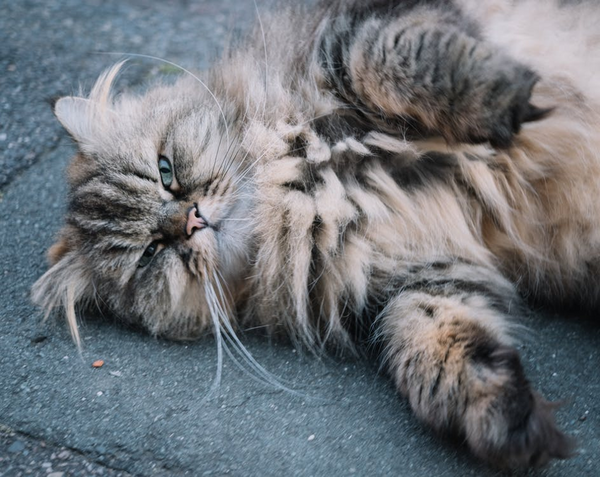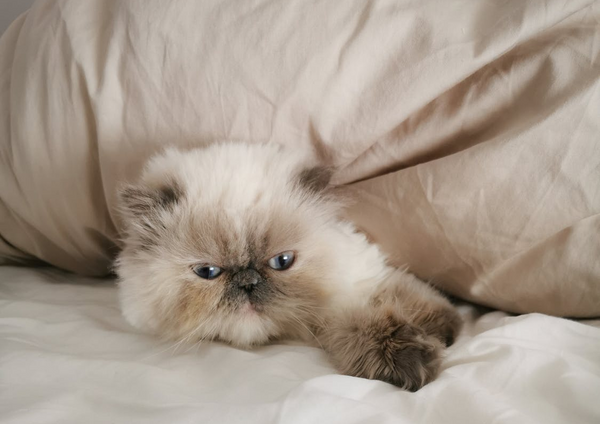The lowdown on Persian cat care
The mild-tempered, friendly Persian is every cat parent’s dream. Does their loveable personality make their breed easy to care for, or will their long, high-maintenance coat drive you crazy? The truth lies somewhere in between.
Keep reading to educate yourself on Persian cat care and discover:
- How to groom your feline’s majestic coat
- What the most common health issues in Persians are
- What the perfect diet for health maintenance and longevity should consist of
How to take care of Persian cats’ coats
Persians are famous for their flat faces and thick double coats, which give them a unique appearance but also present a grooming challenge. Regular grooming sessions are necessary to prevent matting and greasiness, leading to skin rashes and discomfort.
Keep your cat’s fur, ears, nails, and eyes clean by following a thorough grooming routine consisting of:
- Brushing—Persian cats have a long silky coat that quickly becomes matted and tangled if not maintained daily. Instead of a classic brush, use a metal wide-toothed comb, applying soft and short strokes from your cat’s head to their tail. Pay extra attention to the problematic areas—behind the ears, under the chin, the stomach, and underneath each leg
- Eye cleaning—Due to their unique facial structure, Persians often suffer from “weepy” eyes that must be cleaned frequently to prevent the buildup of eye discharge which could cause an infection. Wipe their eyes gently once or twice per day with warm water or a vet-recommended product
- Ear cleaning—Because of Persian cats’ tiny ears, the infections sometimes go unnoticed. Look for any oil or dirt buildup while brushing your kitty and wipe it away with a cotton ball and ear cleaner. If you notice an odour or unusual discharge, contact your vet straight away
- Nail trimming—All felines need to get their nails trimmed, especially indoor ones. While you should tend to front claws every two to three weeks, back claws don’t grow as quickly, so make sure not to cut too deep
- Dental care—Brushing your Persian’s teeth will prevent bad breath, periodontal diseases, and tooth loss. Good oral hygiene is necessary for overall health maintenance because dental diseases can affect other organs, including the heart, liver, and kidneys
- Bathing—Persians hate water, so you shouldn’t bathe them too often. Their coats don’t get too dirty since they’re couch potatoes and don’t spend much time outside. Bathe them every two months unless there's a need for more—for example, if you suffer from cat allergies since these fluffy felines are not hypoallergenic

Me? Tangled? There’s no need to involve shampoo in this!
Source: Ellie Burgin
Don’t skip playtime
Exercise doesn’t come naturally to Persians. Unlike Bengals, Siamese, and Maine Coons, Persians usually need to be tricked into physical activity because they are lazy. Luckily, their strong bond with their cat parents and love for interaction with them make the persuading easier.
Dedicate at least half an hour each day to playing with your Persian to ensure they feel included and stay healthy and happy. Create a fun environment where they can move and jump around freely. If you cannot designate a whole room for them, create playtime-friendly surroundings by installing:
- Perches—Since cats love having a top view, place perches in high spots around your home so that your cat can climb and have personal space. It’ll be fun for them and probably save your couch from demolition
- Scratching posts—Cats love to scratch every chance they get. Your furniture and drapes shouldn’t suffer, so you should get your feline companion both horizontal and vertical scratching posts
- A cat tree—Felines are natural climbers, so they'll enjoy having a cat tree. They use it as a play space or a sleeping corner
Don’t forget the annual check-ups
Like most purebreds, Persians are prone to specific hereditary conditions, and their sedentary lifestyle also entails some lifestyle related-issues. Even if they’re fit as a fiddle, annual check-ups are mandatory, as the vet can detect health problems before the symptoms worsen and prevent or treat them in time.
Kittenhood is an especially risky period in a cat’s life, as they develop rapidly during that time. Don’t miss the regular vet appointments, and make sure your feline gets all the necessary shots, including:
- The rabies vaccine
- The combination vaccine FVRCP
- Feline enteritis vaccine
- Cat flu vaccine
- Feline leukaemia (FeLV) vaccine

I know what time of year it is. You won’t trick me this time!
Source: Claudia Schmalz
Common health niggles in Persian cats
The most common health issues that could befall Persian cats are:
- Worms and parasites—Especially during the early years, cats are susceptible to worms and parasites—most frequently roundworms (intestinal parasites). Symptoms of the infection include vomiting, diarrhoea, tarry faeces, weight loss, skin lesions, and excessive shedding. You can prevent parasite infections with regular deworming meds
- Hereditary health issues—Purebred Persians are susceptible to genetic diseases like polycystic kidney disease (PKD) and progressive retinal atrophy (PRA). Prevention is impossible, but an active lifestyle, healthy diet, and medication can help delay the onset and manage the symptoms. Persian cats also experience many dental and eye problems because of their flat faces
- Lifestyle-related issues—Persians’ inactive lifestyle can cause obesity, diabetes, UTIs, skin problems, and dental issues
Your Persian cat’s immune system will become weaker during senior years, so you should make your vet visits more frequent. Create and maintain a healthy diet from the start to ensure your furry friend stays healthy for as long as possible.
How can diet help with caring for a Persian cat?
Your Persian's meal plan must contain high-quality ingredients and resemble their natural feeding patterns.
Felines should eat lean meat and fish since these ingredients deliver:
- Animal protein
- Animal fat
Animal protein
Animal protein contains amino acids—including arginine and taurine—your Persian needs for:
- Sufficient energy
- Strong muscles
- A healthy coat
Since cats are obligate carnivores, their meals should be rich in animal protein derived from chicken, salmon, tuna, mackerel, prawns, sardines, liver, and turkey.
A vegetarian diet could never work for cats since veggies don’t deliver essential amino acids and are hard to digest. Avoid products that contain any of the following ingredients:
High-protein cat food will help your Persian deal with common health issues, such as
- UTIs, cystitis, and bladder stones
- Gastrointestinal problems, such as constipation and IBS
- Hairballs and hair loss
Animal fat
Animal fat is a viable secondary source of calories. It contains essential fatty acids and gives cat food a delicious taste your Persian won’t be able to resist.
Low-quality commercial products with subpar ingredients often contain flavour enhancers because they’re a cheaper option, but they fail to bring any health benefits to your feline. If your Persian is a fussy eater who isn’t a fan of wet food, products with moderate amounts of fat will make them purr with excitement at every mealtime.
Persian nutrition—the perfect balance
No matter which type of food your Persian kitty prefers—wet, semi-moist, dry, mixed or raw—the ideal nutrient ratio is as follows:
|
Nutrient group |
Ideal percentage |
|
Animal protein |
50% or more |
|
Animal fat |
Up to 20% |
|
Less than 3% |

Do I smell…fatty goodness???
Source: Jeb Buchman
Untamed makes caring for Persian cats easy!
If you’re looking for cat food that’ll keep your Persian’s health in excellent condition and tickle their taste buds, look no further than Untamed!
We make food according to the following principles:
- Meat and fish are our main ingredients
- We gently steam our food
- Vets help us come up with the best recipes
Meat and fish
Untamed meals contain twice the amount of animal protein compared to the industry standard. Fussy or insatiable, your cat will go wild for this amount of high-quality meat and fish.
Untamed recipes, such as Chocka Chicken, Tuck-in Tuna, and Full-on Fishy come in jelly and gravy. Whichever you choose, your Persian will wolf it down and ask for seconds.
Gentle cooking
We gently steam Untamed meals to:
- Get rid of harmful bacteria
- Seal in the nutrients (proteins, fatty acids, vitamins, and minerals)
- Preserve natural taste
Your Persian’s care is our priority, but so is the environment. We are ethical cat food manufacturers, which is why we:
- Get our meat and fish from sustainable suppliers
- Use only 100% recyclable packaging
- Operate as a carbon-neutral business
Caring for your Persian has never been easier! Try Untamed and watch your kitty thrive!
Vet-designed formulas
All Untamed recipes are made in collaboration with vets to ensure your Persian gets all the necessary ingredients in each tin. Our customised meals will cater to your cat’s unique biology regardless of whether you have:
- Kittens who started eating solid food
- Adult cats prone to food allergies
- Pregnant queens who need extra energy
- Senior cats with gum problems, tooth loss, or muscle deterioration
Our food is free of all harmful ingredients, including all known allergens, carbs, artificial additives, flavour enhancers, and colourants.

Untamed offers health and happiness with each bite.
Image (c) Untamed
Get Untamed for your high-maintenance Persian!
The way to your Persian’s heart is through their stomach, and Untamed has the directions!
Ordering our food online is as easy as ABC. All you need to do is:
- Share details about your Persian
- Pick the products
- Order your first trial pack
Your taster pack will arrive in a day, so your Persian can start enjoying our delicacies right away. If they like what they taste, we can replenish your supply around the same time every month!
Persian cat parents who’ve switched their kitties to Untamed have noticed the following improvements:
|
Timeline |
The Untamed effect |
|
Within a week |
|
|
After two months |
|
|
Within four months |
|
|
For life |
|



